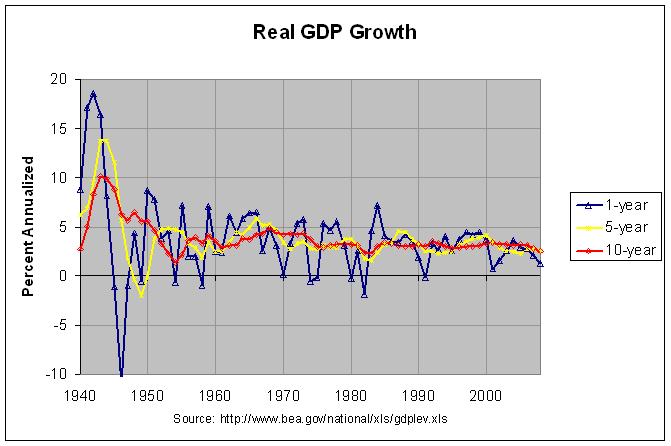United States News
See other United States News Articles
Title: Why Budget Cuts Don’t Bring Prosperity (Editors Note: Liberal flakes think debt brings prosperity)
Source:
NY Times
URL Source: http://www.nytimes.com/2011/02/23/b ... 8476805-+EVLD3awkLTiddJu1p0IDw
Published: Feb ,
Author:
Post Date: 2011-02-23 12:22:41 by go65
Keywords: None
Views: 28235
Comments: 45
Post Comment Private Reply Ignore Thread
Top • Page Up • Full Thread • Page Down • Bottom/Latest
Begin Trace Mode for Comment # 32.
#1. To: jwpegler, skip intro, lucysmom (#0)
ping!
This article is shit. Borrowing doesn't bring prosperity. I guess we should print a million dollars for every American. We would all be millionaires. That's the ticet.
What's venture capital about?
with the exception of Jwpegler, most conservatives will admit that government spending for WWII drove economic growth.
What's funny is they mention this as a reason why socialism does not work. What happens is they misread - or Limbough mistold them - that FDR's programs did not get us out of the Depression only WW2 spending did. Well that proved uber socialism (for a short period until recovery sets in) kicked started the economy and that half measure socialism just kept us afloat - but that goes over their head.
FDR's policies prolonged the depression. You twenty year olds think you know something. You don't. You are clueless.
All of the evidence shows that you are correct. The economy was in worse shape in 1938 than it was when Roosevelt took office in January 1933. Sure WWII finally got people busy. Busy building bombs, tanks, and submarines. Did that make us wealthier? No. The country had to go into massive debt to do it. That deficit spending was unsustainable, just like government deficit spending is unsustainable today. After WWII, the Keynesian Kooks tried to convince Truman to keep the war time economy going. They told him to build tanks and planes and park them in the desert. Truman told them to shove off. Over the next three years, Truman cut government spending by 60% -- from 52% of GDP to 20% of GDP. According to g065, this should have collapsed the economy and put us into a even worse depression. Instead, the private sector responded by creating products and servers that people wanted to buy to improve their lives. Yeah, economic activity was largely flat for those 3 years, but we were quickly transforming from an economy that built tanks and bombs to one that built houses, televisions, and dishwashers. Truman saved this country. Not Roosevelt. Roosevelt nearly destroyed it.
Instead, the private sector responded by creating products and servers that people wanted to buy to improve their lives. Yeah, economic activity was largely flat for those 3 years, but we were quickly transforming from an economy that built tanks and bombs to one that built houses, televisions, and dishwashers. Truman saved this country. Not Roosevelt. Roosevelt nearly destroyed it. They both saved it. Different circumstances require different solutions.
Lucy, I like jwpegler but he has a penchant to post B.S. quite often, his claims about Truman are patently false. Go look at this thread; http://libertysflame.com/cgi-bin/readart.cgi? ArtNum=17226&Disp=40#C40 http://www.house.gov/jec/fiscal/budget/surplus2/surplus2.htm US GDP Growth:
OMG, look at who the charred and burned cast iron kettle is calling black!
There are no replies to Comment # 32. End Trace Mode for Comment # 32.
Top • Page Up • Full Thread • Page Down • Bottom/Latest
#2. To: go65 (#1)
#4. To: A K A Stone (#2)
This article is shit. Borrowing doesn't bring prosperity.
#6. To: lucysmom (#4)
What's venture capital about?
#8. To: go65, lucysmom (#6)
with the exception of Jwpegler, most conservatives will admit that government spending for WWII drove economic growth.
#12. To: Godwinson (#8)
#22. To: A K A Stone (#12)
(Edited)
FDR's policies prolonged the depression.
#28. To: jwpegler (#22)
Truman told them to shove off. Over the next three years, Truman cut government spending by 60% -- from 52% of GDP to 20% of GDP. According to g065, this should have collapsed the economy and put us into a even worse depression.
#31. To: lucysmom, jwpegler (#28)
Truman saved this country. Not Roosevelt. Roosevelt nearly destroyed it.
The 1948-49 Vanishing of a Surplus
After the conclusion of World War II, defense spending fell dramatically. While taxes were lowered slightly, the huge fall in spending led to surpluses by 1947. By 1948, the defense demobilization was essentially complete, and the Nation ran a healthy surplus of nearly $12 billion - well over 4 percent of GDP, the biggest surplus of modern times. Yet within a year, it was all but gone. Why?
The overwhelming reason for the vanishing surplus was an increase in federal outlays of over 30 percent in a single year. Over 60 percent of the increase in spending related to national security and foreign affairs. The heating up of the Cold War after the Berlin Crisis of 1948 no doubt contributed to this. Military budgets were increased considerably, and foreign aid spending soared with the beginning of the Marshall Plan. The $9 billion spending increase dwarfed the $2.2 billion in tax reductions arising from changes in individual income taxation (e.g., the introduction of the joint return). The high wartime marginal tax rates remained. President Truman, however, blamed the 1948 tax reduction for keeping debt reduction from being greater, but the data suggest this was a distinctly secondary factor.11 Truman was pushing, often unsuccessfully, an expensive domestic spending agenda, including a national health insurance program. The near disappearance of the budget surplus, very dear to Truman's heart, was also not primarily a consequence of the relatively mild 1949 recession, which was only a factor in the last half of that fiscal year.12

1941: 19%
1942: 15.2%
1943: -1.88%
1944: 28.14%
1945: -.75
1946: - 1%
1947: - .6%
1948: 7.6%
1949: -3.7%
#32. To: go65 (#31)
he has a penchant to post B.S.
Replies to Comment # 32.
[Home] [Headlines] [Latest Articles] [Latest Comments] [Post] [Mail] [Sign-in] [Setup] [Help] [Register]
